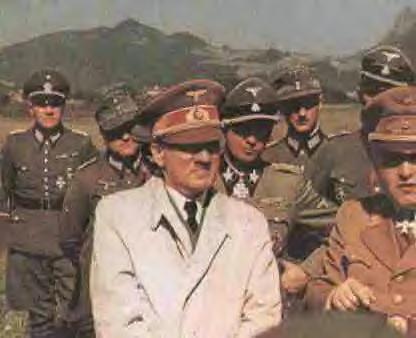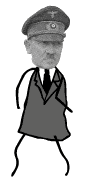
Address To His Generals
February 10, 1939
Caution: Adolf Hitler was completely wrong about absolutely everything...usually. When Hitler said something that was actually correct, it was merely to set up the next lie. As with all good propagandists—and he certainly was that—he would begin with a few obvious, documented facts, and then proceed to distort them horribly. At any rate, the infamous German Führer’s worm-tongue rhetoric is NOT to be taken seriously, except as a classic example of the sort of masterful demagoguery from which appropriate lessons may hopefully be learned.As always, read with an abundant degree of cautious skepticism.
It is probably unique in world history for a man to have embarked as I did on a political career in 1919...twenty years ago...with my background, and to have achieved what I have these last twenty years. Gentlemen, I did it through the loyalty of the Movement that I created. It gave me its blind support not just in good times, but in bad times as well.
Is it too much for me to ask this of the German officers as well? In fact, I'm asking even more! I can't be satisfied just with the German officer paying lip-service to my orders—particularly when everything's going well—I must demand of the German officer that even if the whole nation should desert me in my fight for our Weltanschauung, then he must stand at my side, man to man, with the entire officer corps, and the German soldier too. For six years, now, gentlemen, we had one good fortune after another. In these six years, we have really pulled off miracles!
It is now the duty of all of us to set forth on a new path, calmly and courageously, seizing every opportunity we can. Take my word for it, gentlemen, my triumphs these last few years have only resulted from grasping sudden opportunities. Past generations of cowardly leaders and their advisors missed these opportunities by comfortably objecting: "Militarily speaking, we're not quite ready."
I have taken it upon myself to solve the German problem, that is the German living space problem. Take good note of that; as long as I live, this ideal will govern my every action. Take heed too: the moment I believe that I can make a killing, I'll always strike immediately and I won't hesitate to go to the very brink. Because I'm convinced this problem has to be solved, one way or the other. I'll never shrug my shoulders and say: "Oh dear! I'll leave that for whomever comes after me."
We can best preserve the respect, the prestige that we have already won by seizing every slim opportunity we get to snatch fresh victories. In this way, we will familiarize ourselves with the enemy and, I dare say, the enemy will gradually get accustomed to Germany's strength too. So don't be surprised if over the coming years every opportunity is taken to attain these German objectives, and please give me your blindest support. Above all, take it from me that I will always have scrutinized these matters from every possible angle first—and that once I announce my decision to take this or that course of action, that decision is irrevocable and I will force it through, whatever the odds against us.
All our actions during 1938 represent only the logical extension of the decisions which began to be realized in 1933. It is not the case that during this year of 1938, let us say, a particular action occurred which was not previously envisaged. On the contrary, all the individual decisions which have been realized since 1933 are not the result of momentary considerations but represent the implementation of a previously existing plan, though perhaps not exactly according to the schedule which was envisaged. For example, in 1933 I was not exactly certain when the withdrawal from the League of Nations would occur. However, it was clear that this withdrawal had to be the first step towards Germany's revival. And it was further clear that we would have to choose the first appropriate moment. We could see from the start that the next step would have to be rearmament without the permission of foreign countries, but naturally we could not gauge the exact speed and extent of this rearmament right from the start. It was also further obvious that, after certain period of rearmament, Germany would have to take the daring step of proclaiming to the world its freedom from restrictions on rearmament. At the beginning, naturally one could not foresee the right moment for this step. Finally. it was further clear that every further step must first involve the remilitarization of the Rhineland. The date for this was in fact envisaged as being one year later: I did not think I would carry it out until 1937. the circumstances at the time made it seem appropriate to carry it out as early as 1936.
It was also quite obvious that the Austrian and the Czech problems would have to be solved in order further to strengthen Germany's political and, in particular, her strategic position. To start with, I was not quite sure whether both problems ought to be or could be solved simultaneously or whether one should deal first with the question of Czechoslovakia or with the Austrian questions. There was no doubt that these questions would have to be solved and so all these decisions were not ideas which were realized at the moment of their conception, but were long-made plans which I was determined to realize the moment I thought the circumstances at the time would be favorable
Fuehrer Adolf Hitler <—Yeesh! What a bore! And liar as well.
Twitter: @3rdReichStudies FB: Horrific 20th Century History





Disclaimer: The Propagander!™ includes diverse and controversial materials--such as excerpts from the writings of racists and anti-Semites--so that its readers can learn the nature and extent of hate and anti-Semitic discourse. It is our sincere belief that only the informed citizen can prevail over the ignorance of Racialist "thought." Far from approving these writings, The Propagander!™ condemns racism in all of its forms and manifestations.
Fair Use Notice: The Propagander!™may contain copyrighted material the use of which has not always been specifically authorized by the copyright owner. We are making such material available in our efforts to advance understanding of historical, political, human rights, economic, democracy, scientific, environmental, and social justice issues, etc. We believe this constitutes a "fair use" of any such copyrighted material as provided for in section 107 of the US Copyright Law. In accordance with Title 17 U.S.C. Section 107, the material on this site is distributed without profit to those who have expressed a prior interest in receiving the included information for research and educational purposes. If you wish to use copyrighted material from this site for purposes of your own that go beyond 'fair use', you must obtain permission from the copyright owner.
A Joke: Hitler and Goering were arguing about the Jews, with Goering stating that they were quite clever people and Hitler vehemently denying they were any such thing. Finally Goering told Hitler that they should go shopping in Berlin and Goering would show Hitler it was true. Hitler agreed, so they disguised themselves and went out on the street.
Goering took Hitler into a shop, went up to the counter, and asked the clerk: "Do you have any left-handed teacups?" The clerk stared at Goering for a moment and then said no, mein herr, I do not.
The two left with Hitler complaining that he did not understand what the point of this was and Goering telling him to be patient. They went to another shop and Goering gave the same act: "Do you have any left-handed teacups?" The clerk stared and shrugged his shoulders.
They left with Hitler becoming incensed over this nonsense and Goering begging for patience. Finally they went into a Jewish shop; Goering again asked the clerk: "Do you have any left-handed teacups?"
The clerk smiled graciously, went into the back room and made a show of rummaging around, brought out a saucer and teacup, set down the saucer, and carefully placed the cup with the handle pointed so Goering could pick it with his left hand. "There you are, mein herr!" the clerk said.
Goering bought the teacup, thanked the clerk, and the two men left. Goering turned to Hitler and said: "See, I told you the Jews were very clever people."
"I don't see what was so clever about that," Hitler snapped. "He just happened to have one in stock!"


















